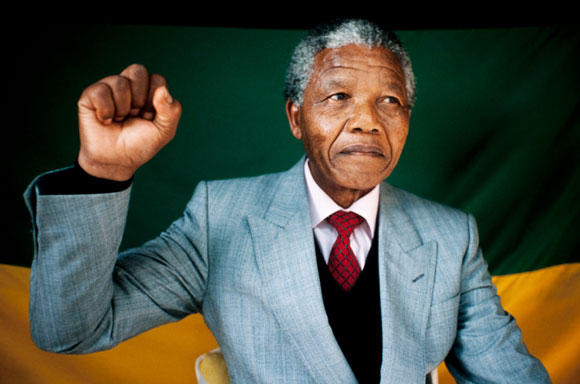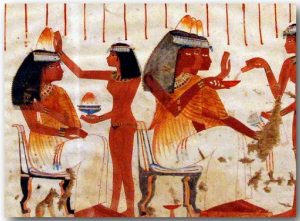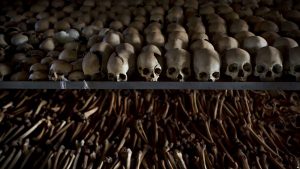Winner of the Spring 2019 StMU History Media Award for
Article with the Best Title
“I have fought against white domination, and I have fought against black domination. I have cherished the ideal of a democratic and free society in which all persons will live together in harmony and with equal opportunities. It is an ideal which I hope to live for and to see realized. But if it needs be, it is an ideal for which I am prepared to die.” 1
The world does not split between only black and white or good and bad. Shades of gray overtake our everyday lives and can make it difficult to navigate ethical dilemmas. Laws and rules do not necessarily make things clearer, nor black and white. Some rules, even those repeated throughout history, may neither be ethical nor positive for people or the societies on which these laws are imposed. If one breaks a law, one can be indicted as a criminal. However, breaking unjust laws provides the philosophical roots of civil disobedience and the motivation of freedom fighters. Nelson Mandela broke the highest law of his land and was tried for treason, not once, but twice. Yet, most recognize Nelson Mandela’s act as justified and he continues to be held in our highest regards, even winning a Nobel Peace Prize. How can one commit treason, be sentenced to life in jail, and still be one of the most beloved leaders and symbols of freedom around the world? Because Nelson Mandela fought for the freedoms of all his people, he fought against an unjust government determined to exploit and dehumanize all people of color, even the indigenous, the legitimate people of the land. Nelson Mandela did not betray the people; he committed treason against an oppressive government for all the right reasons. His world was literally divided into black and white, where white was always lawful, and Africans were always wrong. Mandela fought against laws that had no legitimacy.
On June 12, 1964, the courthouse and the streets around it were filled with those waiting to hear the verdict against Nelson Mandela and eight others during the Rivonia Trials. Judge Quartus de Wet delivered the news that these nine activists were sentenced to life in prison on the charges of conspiracy and sabotage, noting that the actions Mandela and the others committed were “in essence one of high treason” though he did not go as far as to implement the highest form of punishment in accordance with treason.2 The Rivonia Trials were supposed to end Mandela’s fight for justice for South Africa but in fact it only provided him the greatest international stage ever.

Mandela’s first arrest happened in 1952 when the African National Congress (ANC) and National Youth League was being led by Nelson Mandela. He organized a campaign called the “Campaign of Defiance against Unjust Laws,” which was the largest non-violent protest that South Africa had ever seen. The Defiance Campaign was also the first campaign to have all races included in one party in defiance of Apartheid rules by the ANC. 3 Mandela and the other leaders of the Defiance Campaign convinced hordes of volunteers to refuse carrying the books that designated their racial status and to go into the parts of the cities that were forbidden to them. Moreover, the Youth League defied curfews and violated segregation in governmental businesses, such as train stations and post offices. Despite the non-violent nature of the protests, the government became increasingly more worried about the protestors. Members of the Defiance Campaign were frequently arrested for the crimes they committed, but most were minor offenses and were short term prison sentences. This did nothing to stop the influx of volunteers. The numbers rose from 7,000 to 100,000. 4 In December 1952, Mandela was, along with nineteen others, charged for violating the Suppression of Communism Act. The government sentenced them to nine months in jail.
Four years later, in 1956, Mandela was arrested for the second time, during a raid on him home. In his autobiography, “Long Walk to Freedom,” he recalls his arrest that night, asking the arresting officer questions about overpowering him. When the officer said Mandela was playing with fire, he responded with “Playing with fire is my game.” 5” Mandela was put on trial and charged with treason, alongside 155 others, in what would become known as the “Treason Trial.” Four very long years later, the courts eventually found all defendants not guilty. The Treason Trial lasted four years for a number of reasons, mainly the number of people on trial. Defense Lawyer Israel Maisels argued that these individuals were not guilty because “Treason is a crime distinguished by the means used rather than the end” aimed for. 6
In 1960, the ANC was banned and when the trials concluded, Mandela, fearing for his life, fled to the underground, and eventually out of country, first Sudan, then other African countries and London, with a fake passport. During his time under ground and outside the country, the banned ANC gave him permission to gather the forces necessary to create and build an army, essentially taking an organization that treated nonviolence as its core, to a different kind of organization, with a future none could ever predict. 7

Mandela’s return to South Africa would lead to his third, and final, arrest, but not his last trial. Within days of returning, on August 5, 1962, on a drive to a meeting, Mandela was pulled over ending his seventeen months of unrestricted freedom he enjoyed outside of the country. 8 He was arrested and charged with five years imprisonment upon reentering South Africa for leaving and returning to the country without the proper paperwork and inciting violence. It was in this trial that Mandela fully realized who he could be in this fight for justice. He realized that he was “the symbol of justice in the court of the oppressor, the representative of the great ideals of freedom, fairness, and democracy in a society that dishonored those virtues. [He] realized then and there that [he] could carry on the fight even within the fortress of the enemy.”9”
This leads us back to where we started: The Rivonia Trials, which ended in twenty seven years of Nelson Mandela’s life in prison before becoming the first black Head of State for South Africa. In 1948, Apartheid became the system of governance and norms imposed on South Africans. Apartheid refers to total racial segregation, keeping white apart from all people of color. Under Apartheid, the minority led white government of South Africa divided the population in “whites”, “coloreds,” and “blacks.” Under Apartheid, many laws were passed that further segregated the country, like the Bantu Authorities Act in 1951, which designated areas where blacks were forced to resettled. 10 After spending 27 years in jails, and surviving from tuberculosis, Mandela’s fight had only but started. He strongly opposed De Klerk while working and negotiating with him to set up the rules for the first truly democratic elections in 1994. Unsurprisingly, the ANC and its presidential candidate, Mandela, won the election and proceeded to a peaceful tradition of power. Apartheid had been ended by parliament a few years earlier in order to pave the way for more democratization. Mandela purposefully did not seek reelection and went on to serve with the UN as a Special Envoy to help negotiate peace in other areas of the Africa Continent. While Mandela passed on December 5th, 2013, we should heed his words of advice that one cannot rest too long at the top of the hill for our freedom comes with many responsibilities and neither is our walk yet completed.
“I have walked that long road to freedom. I have tried not to falter; I have made missteps along the way. But I have discovered the secret that after climbing a great hill, one only finds that there are many more hills to climb. I have taken a moment here to rest, to steal a view of the glorious vista that surrounds me, to look back on the distance I have come.11”
“But I can rest only for a moment, for with freedom come responsibilities, and I dare not linger, for my long walk is not yet ended. 12”
- Nelson Mandela, Speech at Rivonia Trial, April 20 1964, The Telegraph, https://www.telegraph.co.uk/news/worldnews/nelson-mandela/10140564/Nelson-Mandelas-address-from-the-dock-at-the-Rivonia-Trial.html . ↵
- The State vs. Nelson Mandela and Others, Supreme Court of South Africa (June 12, 1964). ↵
- Sahoboss, “Defiance Campaign 1952,” South African History Online, March 19, 2018 http://www.sahistory.org.za/topic/defiance-campaign-1952. ↵
- Marcia Amidon Lusted, “Peaceful Protest,” Cobblestone 29, no. 4: 40, 2008. ↵
- Nelson Rolihlahla Mandela, Long Walk to Freedom, (Randburg: Macdonald Purnell, 1994):23. ↵
- Hisotircal Papers, The Treason Trial, Original Transcript, University of Witwatersrand and Johannesburg, http://www.historicalpapers.wits.ac.za/inventories/inv_pdfo/AD1812/AD1812-I1-001-jpeg.pdf . ↵
- “Timeline,” Nelson Mandela Foundation, Accessed April 08, 2019 https://www.nelsonmandela.org/content/page/timeline. ↵
- Nelson Rolihlahla Mandela, Long Walk to Freedom, (Randburg: Macdonald Purnell, 1994):49. ↵
- Nelson Rolihlahla Mandela, Long Walk to Freedom, (Randburg: Macdonald Purnell, 1994):49. ↵
- Salem Press Encyclopedia Research Starters, 2014, s.v. “Apartheid,” by Lucas, Emma T. ↵
- Nelson Rolihlahla Mandela, Long Walk to Freedom, (Randburg: Macdonald Purnell, 1994). ↵
- Nelson Rolihlahla Mandela, Long Walk to Freedom, (Randburg: Macdonald Purnell, 1994). ↵



63 comments
Thomas Fraire
Nelson Mandela is a true hero, he devoted his life to fighting for something that he really cared about. This article portrayed him ina light the seems true to the very amazing life he lived. I really enjoyed it, and it told a very good story. It never felt like an encyclopedia because of how to throw the research was. Congrats on your nomination!
Danniella Villarreal
Congratulation on the nomination. I love the quotes used in the article and this was a very nice read. Mandela was quite an extraordinary leader and a fighter. I didn’t really know much about how Mandela ended up as the president of South Africa. I liked how determined and unique this man way. Very nice article to read.
Mia Morales
Nelson Mandela is such an inspiring person, he advocated for peaceful protestests and was a martyr for his beliefs. This was an amazing article and captivated all that Mandela stood for. Not only did he make a difference in his country but he is respected worldwide and is a symbol of peace and integrity.
Krystal Rodriguez
I have always heard such great things about Nelson Mandela. It is astonishing to see that he wanted to solve things without violence. In todays day and age we seem to try and resolve everything with war and deaths. We want to make a big statement with how many innocent people can die in a day. Ultimately, that is not fair to the innocent citizens of these countries. Nelson Mandela did everything in is hands to decrease the violence and solve things in a calm and orderly manner even if he was later hurt for it.
Isaiah Torres
Again another article on this man who I have always seen and have never knew history about. Ive read another article on him and it was a really great story. Hearing this one adds on to the greatness and inspiration behind this man. I like hearing different things about this man is a great story because it makes it feel like somebody is making a difference especially in another country.
Chelsea Alvarez
The title of this article really captivated my attention. I truly enjoyed the article in its entirety because this topic illustrates what Nelson Mandela stood for. It is crazy and unfathomable that Mandela was sentenced to treason because of what he believed. Because of the government that the United States has and the freedom of speech amendment, I don’t see anything wrong with the way that Mandela organized and participated in non-violent protests. Mandela’s fight with both his health and his advocacy for equality really shows just how resilient and dedicated he was to the cause.
Octaviano Huron
Nelson Mandela was an inspiration to countless citizens of South Africa and all over the world who are struggling to fight against discrimination and prejudice. Apartheid was a cruel system that had left many natives of Africa without hope or mercy. Nelson Mandela had an immeasurable amount to courage to stand up against unjust law and change the ways of an entire nation.
Amariz Puerta
I really enjoyed reading this article it was extremely well written and put together with lots of detail. I really loved learning about Nelson Mandela in my high school classes. He led such a large movement and was so powerful about everything he did. He is such a great figure to look at and admire, extrmemely well written article and very informative.
Sarah Uhlig
Nelson Mandela’s story is very unique and very inspiring. I really like reading your articles. This is probably the third one I have read tonight and I enjoy seeing the detail and hard work you put into your articles. I also liked how this story pertained to one specific person and how The Nobel Peace Prize ended up in his alley for all his work. I liked the determination and uniqueness this man brought to the table.
Mariah Garcia
First of all, Nelson Mandela was a bad dude, and an amazing champion for equality in time and place that so desperately needed it. And in addition, the way you presented this article was very well-handled. I appreciated the detail and clarity, as well as the overall flow of narrative that permeated throughout your writing. Nelson Mandela was a phenomenal leader and worked hard to achieve his goals.